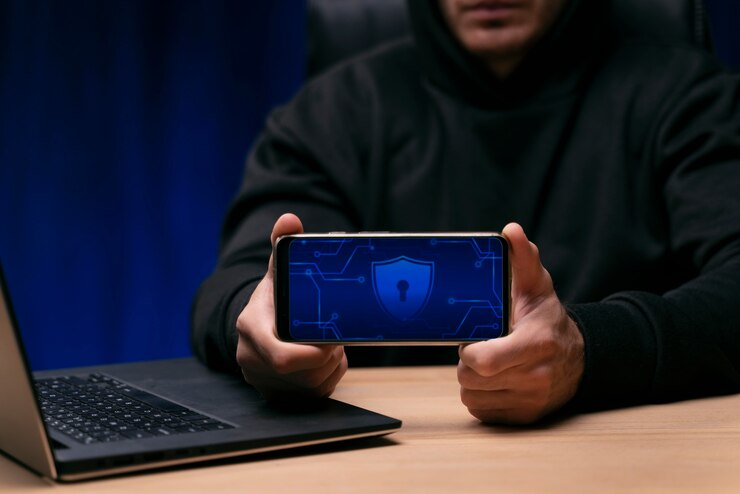In today’s tech-driven world, our smartphones have become extensions of ourselves. We use them for everything, from banking to social media. However, this dependence on mobile technology has made smartphones an attractive target for hackers. So, how can you protect your smartphone from being hacked? This guide will walk you through practical steps and security measures to keep your device safe.
Outline
- Introduction
- Why Hackers Target Smartphones
- Common Ways Hackers Infiltrate Smartphones
- Phishing Attacks
- Malware
- Public Wi-Fi Exploits
- The Importance of Regular Software Updates
- Using Strong, Unique Passwords
- Password Managers
- Two-Factor Authentication (2FA)
- Beware of Suspicious Links and Apps
- Download Apps from Trusted Sources Only
- Check App Permissions
- The Role of VPNs in Smartphone Security
- What is a VPN?
- Benefits of Using a VPN
- Encrypting Your Data
- How to Encrypt Your Smartphone
- Why Encryption is Crucial
- The Danger of Public Wi-Fi
- Risks of Using Public Networks
- Safe Practices When Using Public Wi-Fi
- Securing Your Bluetooth Connection
- Use Anti-Malware and Security Apps
- Top Security Apps for Smartphones
- How Anti-Malware Software Works
- Keep Backups of Your Data
- Recognize the Signs of a Hacked Smartphone
- Common Indicators
- What to Do if You’re Hacked
- Factory Reset as a Last Resort
- Conclusion
- FAQs
Introduction
Our smartphones hold an immense amount of personal information, from sensitive emails to financial details. Because of this, hackers constantly develop new ways to break into smartphones. This article will provide you with simple yet effective strategies to secure your device and prevent cyber-attacks.
Why Hackers Target Smartphones
Why would a hacker target your smartphone? The answer is simple: your phone holds valuable data. Personal photos, social media accounts, banking apps, and even your GPS location can be exploited for profit or malicious intent. As more people rely on mobile devices, hackers have shifted their focus from desktop computers to smartphones.
Common Ways Hackers Infiltrate Smartphones
Phishing Attacks
Phishing is one of the most common hacking methods. Hackers use deceptive emails, messages, or websites to trick you into giving up your personal information. Once they have your login details, it’s game over.
Malware
Malware can be disguised as a harmless app or link. Once installed, it can steal data, track your activities, and even control your phone remotely.
Public Wi-Fi Exploits
Using free public Wi-Fi seems convenient, but it’s one of the easiest ways for hackers to intercept your data. Without encryption, hackers can see everything you do online.
The Importance of Regular Software Updates
It might be tempting to ignore those annoying update reminders, but updating your software is one of the easiest ways to keep your smartphone secure. Updates often patch vulnerabilities that hackers are quick to exploit. Make sure both your operating system and apps are always up to date.
Using Strong, Unique Passwords
Password Managers
A strong password is your first line of defense. Avoid using the same password for multiple accounts. To keep track of complex passwords, consider using a password manager, which securely stores all your credentials.
Two-Factor Authentication (2FA)
For an extra layer of security, enable two-factor authentication (2FA) whenever possible. This requires a secondary confirmation, such as a code sent to your phone, in addition to your password.
Beware of Suspicious Links and Apps
Download Apps from Trusted Sources Only
Stick to downloading apps from trusted sources like the Apple App Store or Google Play. Avoid third-party app stores, as they are more likely to host malicious software.
Check App Permissions
Before installing any app, review its permissions. If an app requests access to something unnecessary (like your microphone for a simple notepad app), it’s best to steer clear.
The Role of VPNs in Smartphone Security
What is a VPN?
A Virtual Private Network (VPN) creates a secure tunnel between your device and the internet, encrypting your data and hiding your online activities.
Benefits of Using a VPN
Using a VPN protects your data from prying eyes, especially when you’re on a public Wi-Fi network. It’s a must-have for anyone concerned about their online privacy.
Encrypting Your Data
How to Encrypt Your Smartphone
Most modern smartphones have built-in encryption options. In your settings, you can enable full-disk encryption to ensure that your data is unreadable without the correct passcode.
Why Encryption is Crucial
Encryption turns your information into unreadable code, which protects it in case your phone is stolen or hacked.
The Danger of Public Wi-Fi
Risks of Using Public Networks
Hackers love public Wi-Fi because it’s easy to exploit. Without proper encryption, anything you do on a public network can be monitored or stolen.
Safe Practices When Using Public Wi-Fi
If you must use public Wi-Fi, avoid accessing sensitive accounts (like banking) and always connect through a VPN.
Securing Your Bluetooth Connection
Bluetooth can be another entry point for hackers. Always turn off Bluetooth when you’re not using it, and avoid pairing with unknown devices.
Use Anti-Malware and Security Apps
Top Security Apps for Smartphones
Popular apps like Norton Mobile Security and Bitdefender Mobile offer real-time protection against malware, phishing, and more.
How Anti-Malware Software Works
These apps scan your phone regularly, detect threats, and provide tools to remove malware before it causes harm.
Keep Backups of Your Data
Backing up your smartphone regularly ensures that, even in the worst-case scenario, you won’t lose your important files and information.
Recognize the Signs of a Hacked Smartphone
Common Indicators
Unexplained data usage, slow performance, and unfamiliar apps or messages are all red flags that your phone might be compromised.
What to Do if You’re Hacked
If you suspect your phone is hacked, disconnect it from the internet immediately. Run a security scan and change your passwords. If necessary, perform a factory reset.
Factory Reset as a Last Resort
If all else fails and your phone has been severely compromised, a factory reset will wipe all data and restore the phone to its original settings. Remember to back up your data before doing this!
Conclusion
Smartphones are an integral part of our lives, but they are also vulnerable to cyberattacks. By taking proactive steps—such as using strong passwords, enabling encryption, and avoiding public Wi-Fi—you can significantly reduce the risk of being hacked. Stay vigilant and keep your phone secure.
FAQs
1. Can hackers access my phone remotely?
Yes, if they manage to install malware on your device or trick you into providing access through phishing.
2. How do I know if my smartphone has been hacked?
Look for unusual activity, like high data usage, unfamiliar apps, or messages being sent without your knowledge.
3. Should I use a VPN on my phone?
Absolutely. A VPN can protect your data, especially when you use public Wi-Fi.
4. What should I do if I accidentally click a phishing link?
Immediately disconnect from the internet, run a security scan, and change your passwords.
5. Can factory resetting my phone remove a hacker?
Yes, a factory reset can remove most malware and unauthorized access, but it should be used as a last resort.


